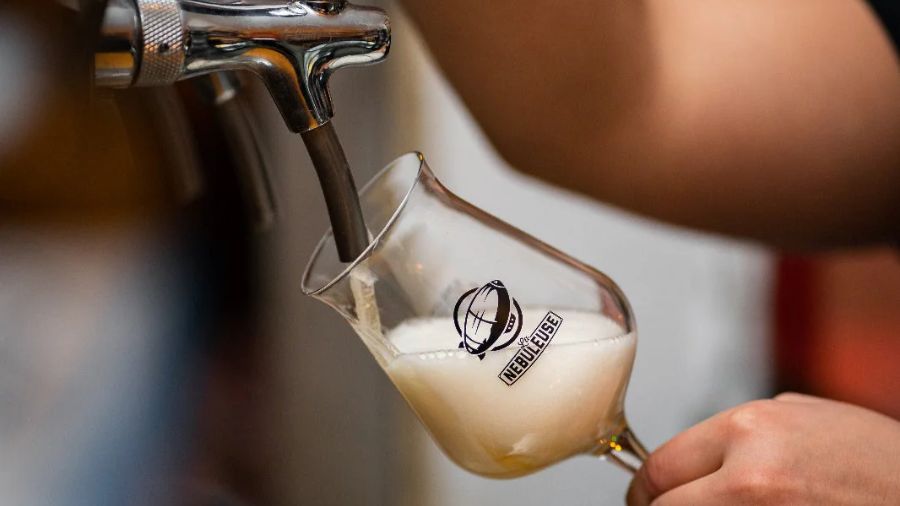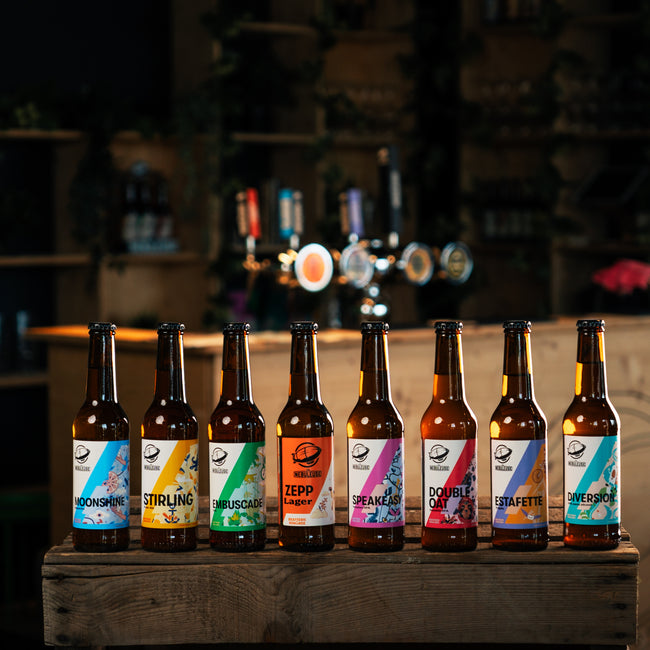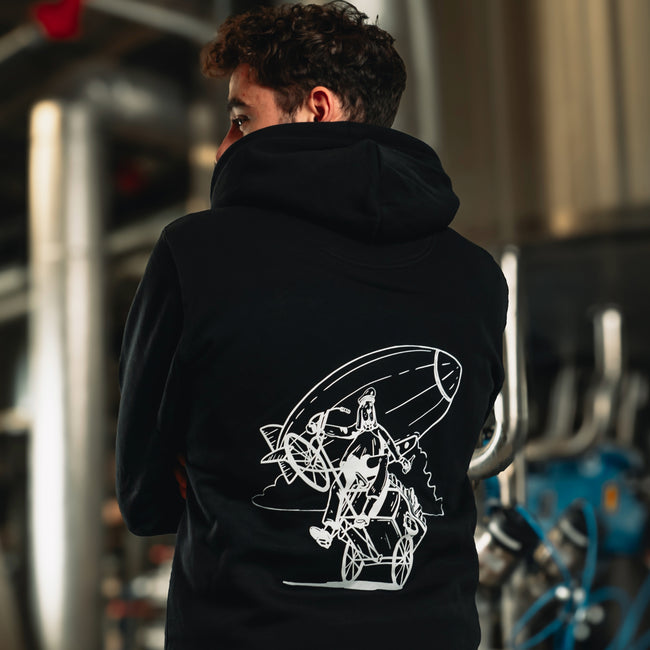The craft beer movement explained for the uninitiated

"Craft beer," "artisanal beer," "microbrewery"... These terms bombard you from all sides, plastered on colorful labels, chanted by your friends who have suddenly become hop experts, and yet, let's face it, their meaning remains as murky as an unfiltered hefeweizen.
At La Nébuleuse, we often have that moment when someone enters our brewery with the legitimate question: "But what exactly is craft?" A curious, slightly perplexed look, oscillating between skepticism and fascination. And we love it. Because behind this trendy term lies much more than a marketing strategy. It's an entire philosophy, a movement, an approach that is revolutionizing our relationship with this age-old beverage.
The three fundamental pillars of craft
Craft beer isn't just a beer style or a trendy label. It's an approach defined by three fundamental pillars that, together, create the uniqueness we champion every day.
Independence and creative freedom
The first rule of craft brewing: no external boss dictates what we brew. A true craft brewery is majority-owned by its founders or employees, not a multinational conglomerate that prioritizes margins over flavor.
This independence is our trump card, our superpower. It allows us to say "what if we tried..." without having to convince a marketing committee. It allows us to brew a Zepp , which respects the Pilsner tradition while infusing it with our unique character, without worrying about pleasing the greatest number.
Volume and human scale
Craft is also defined by production on a human scale. In the United States, the cradle of the movement, we're talking about less than 6 million barrels annually, a figure that would make industrial giants smile.
This volume constraint isn't a handicap, but a deliberate choice that ensures attention to every step of the process. Our brewers can monitor each brew, adjust, taste, and verify. We don't simply program machines before leaving for the weekend. We live with our creations.
The artisanal approach in every brew
The third pillar is the artisanal approach. It is manifested in these carefully selected ingredients, these sometimes more laborious methods that make all the difference, this desire to create something that bears our signature.
Take our Ambush . This IPA isn't a formula for maximizing profitability. It's born of trial, error, tweaking, and passionate tasting. Its balance of bitterness and citrus notes tells the story of our quest for an IPA that reflects us. That's where craftsmanship lies: in this sometimes obsessive search for character rather than standardization.
A journey through time between rebels and pioneers
The craft movement didn't appear spontaneously in our Swiss mountains. It has a history, roots, and a context that explains its emergence.
It all began in 1970s America, when a few stubborn brewers decided to fight back against market standardization. At the time, brewing anything other than a light, bland lager was pure rebellion.
In Switzerland, things accelerated starting in 1991 with the abolition of the beer cartel that had regulated the market since 1935. Suddenly, the way was clear for innovation. From 32 breweries in 1990, we've grown to more than 1,200 today! This creative explosion has transformed our small country into the world champion for the number of breweries per capita.
It was in this vibrant context that our adventure began in 2014, when three childhood friends decided to transform their passion into an entrepreneurial project. Based in Renens, we embrace this creative freedom while developing our own interpretation of craft.
The values that make the difference
Behind the stainless steel vats and colorful labels lies a system of values that fundamentally distinguishes the craft approach from the industrial one.
Creativity without compromise
The craft brewer approaches his tank like a researcher approaches his laboratory or an artist approaches his canvas, with a desire to explore, to test, to push boundaries. This creativity is not an occasional luxury but our daily bread.
When we develop a new recipe, the question is never "Will this appeal to the masses?" but rather "Does it excite us? Does it bring something new to the table?" It's this creative freedom that allowed us to develop our Double Oat , an IPA that defies categories with its smooth profile and explosive tropical aromas.
Quality and authenticity
Quality is non-negotiable. Period. We choose our malts, hops, and yeasts based on their ability to express our vision, not their price. We take the necessary time for each step of brewing, without chemical or technological shortcuts.
This obsession costs us more, takes more time, requires more effort, and we're proud of it. Because ultimately, it's this difference that ends up in your glass and fully justifies those few extra francs you invest in a craft beer rather than an industrial one.
Community and collaboration
A unique phenomenon in the entrepreneurial world: craft breweries rarely see themselves as direct competitors. We prefer to talk about "coopetition," a blend of cooperation and healthy competition that elevates the entire ecosystem.
Cooperative brewing has become a signature practice of our movement. We exchange advice, lend equipment, and share suppliers. This community mentality extends to our relationship with you, our drinkers: we don't want passive consumers, but informed participants.
Radical transparency
We have nothing to hide, neither in our ingredients nor in our processes. This transparency is not only an ethical stance, it is also an invitation to informed appreciation.
When we list hop varieties on our labels, it's not out of pedantry, but to give you the keys to understanding what you're tasting. We want you to know why our Moonshine has those citrus and spice notes, because understanding intensifies the pleasure.
Craft vs. industrial: distinguishing the real from the fake
Faced with the success of the craft movement, large industrial groups have developed sophisticated strategies to capture this new demand, sometimes creating deliberate confusion between authentic craftsmanship and well-crafted marketing.
The fundamental differences
Craft beers differ fundamentally from industrial beers in their very approach to creation.
Industrial brewing optimizes for absolute consistency and minimal cost. Every bottle must be strictly identical in Tokyo, New York, or Lausanne. To achieve this perfect standardization, stabilizing additives, industrial enzymes, and other technical interventions are commonly used.
Conversely, we accept slight variations between our brews, as we work with natural ingredients that evolve with the harvest. We embrace this variability just as a winemaker accepts that his 2021 vintage will differ subtly from his 2020.
How to recognize a real craft brewery
An authentic craft brewery is generally recognizable by several signs:
-
She communicates openly about her founders and her team
-
She invites you to visit her facilities and meet her brewers.
-
She details her ingredients and methods
-
She is actively involved in her local community
-
It offers evolving creations, limited editions, experiments
But the ultimate test remains attentive tasting. A true craft beer generally offers more intense, more complex, more distinctive flavors. It bears the signature of its creators rather than the anonymity of industrial optimization.
From our vats in Renens, we observe this creative effervescence with enthusiasm. Our deep conviction is that craft beer is not a passing fad, but a return to the very essence of beer: a local, diverse product, carrying identity and culture.
The craft movement represents this reconnection with authenticity that our hyperindustrialized society desperately seeks. It reminds us that behind every glass lies know-how, values, and faces, not just a standardized product from an anonymous production line.
So the next time you enjoy a craft beer, take a moment to appreciate not only its flavors, but also the philosophy that gave birth to it. And if you're curious, come to our brewery in Renens. We'd be delighted to share our passion and vision of craft beer in more detail, glass in hand, of course.
Cheers 🍻








